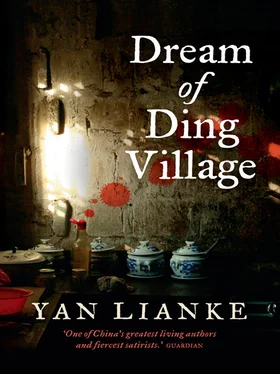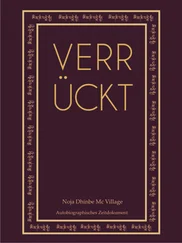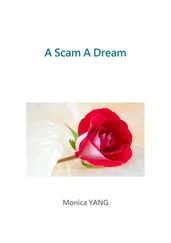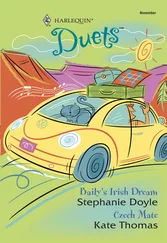Once, as one of the residents, a spotty young man in his early twenties, was coming through the gate, Grandpa asked him: ‘Now that Genzhu’s little brother is married, did he ever return those desks he borrowed?’
‘You mean Chairman Jia? No one calls him Genzhu any more.’
Grandpa stared at the man, speechless.
‘Didn’t you know? Uncle Jia and Uncle Ding are our new chairmen.’
The young man continued into the schoolyard, leaving Grandpa speechless at the gate, gawping like a rejected traveller at a border crossing. The school was a different country, and Grandpa was no longer a citizen.
Then the next day, at dusk, as the sun faded from a brilliant yellow to a pale, washed-up pink, Zhao Xiuqin had returned from the village carrying a bamboo basket filled with cabbages, carrots, rice noodles, two fish, several pounds of meat and a bottle of liquor. The meat looked to be the freshest, finest cut of pork; the label on the bottle read ‘Song River Sorghum’, the best local sorghum whisky money could buy. Even unopened, the bottle gave off a powerful fragrance. As Zhao Xiuqin passed through the gate, Grandpa smiled benevolently and said: ‘Aha. . we’re moving up in the world, I see.’
The cook beamed. ‘Yes, I’m making dinner for Chairman Jia and Chairman Ding tonight.’
Grandpa was confused. ‘So that meat isn’t for everyone?’
‘Chairman Jia and Chairman Ding managed to get us some government funding,’ the cook explained, ‘so we thought we’d all pitch in and make them a nice meal. You know, to thank them.’
It was only then that Grandpa realized Jia Genzhu and Ding Yuejin had been appointed co-chairmen of the Ding Village task torce on HIV and AIDS, thus the elevated titles. There was a new social order in the school, a new pecking order. It wasn’t so different from the periodic political reshufflings in village, county, district or provincial government; there had been a changing of the guard, and nothing would be the same. Grandpa couldn’t help but feel bitter, somehow impoverished. But since the lives of the sick villagers seemed to be less so, there was really nothing he could say. He had no authority, nothing to do and no one to lead.
He woke the next morning, still feeling useless and idle. After loitering at the gate for a while, he decided to take a walk around the outside of the school. He strolled along like a man making a circuit of his own property, admiring the early spring foliage that covered the exterior of the school wall. When he reached the gate again, Grandpa found a crowd of people busily carting things out of the school.
Some had two classroom desks hanging from either end of a shoulder pole, while others struggled under the weight of large blackboards. Some worked in pairs to carry away heavy crossbeams, while others worked in groups of three or four, pushing carts laden with beds taken from the teachers’ quarters. Sweating from their exertions, faces beaming with excitement, the residents of the school were carrying their trophies back to their homes in the village. It was just like Grandpa had imagined in his dream: a flower-filled early spring, gold growing from the soil, a village hurrying its treasure home. .
As they bustled around, the residents eyed one another’s items and compared notes on who had got what:
‘Your desk is better than mine. . the wood’s much thicker.’
‘If you sell that plank of elm, it’ll be worth a lot more than this paulownia.’
‘You got a bed made of chestnut? All I got was one made of toon.’
The metal gates of the school opened like a sluice, releasing a flood of villagers. Grandpa, wondering what had happened, quickened his pace and caught up with Jia Hongli, a younger cousin of Jia Genzhu. Despite his illness, the young man was carrying a shoulder pole laden with three shiny classroom desks.
‘What’s going on here?’ Grandpa demanded.
Jia Hongli gave Grandpa a sideways glance. ‘If you want to know what’s going on,’ he huffed, ‘why don’t you go and ask your son Ding Hui?’
The young man stalked off with his cargo of desks, like a tiny mountain goat trying to drag a mountain home to graze. Still confused, Grandpa stood at the gate until he saw another resident approaching, struggling under the weight of an enormous blackboard. Grandpa couldn’t see the man’s face, but he recognized the blackboard by the nail sticking out of one corner. It was a favourite from his substitute-teaching days: a large chalkboard set in a fine-grained elm-wood frame, with a smooth glossy surface that chalk seemed to glide across. For convenience, Grandpa had placed a nail in the lower right-hand corner so that he could hang a piece of cloth for wiping the board. Now the blackboard was inching across the schoolyard, covering the man’s back like the shell of a snail.
As the man reached the gate, Grandpa lifted the chalkboard from his back and forced it to the ground. Zhao Dequan emerged from underneath with a sheepish grin. ‘Oh, Professor Ding. .’ he said nervously.
‘So it’s you!’ Grandpa shook his head. ‘Planning to teach classes in your house now, are you?’
Zhao Dequan glanced around in alarm to make sure no one was within earshot.
‘I had no choice but to take it,’ he explained. ‘Chairman Jia and Chairman Ding gave us these things, and everyone has collected theirs. If I refused, it would look bad, and everyone would be offended, including the chairmen.’
Zhao Dequan turned to look behind him. Seeing that the schoolyard was empty, he told Grandpa: ‘If you can’t bear to part with this blackboard, I’ll help you hide it in your room. Just don’t tell anyone I gave it you.’
‘What were you planning to do with it, anyway?’ asked Grandpa, stroking the blackboard.
‘Use it for my coffin, of course,’ Zhao Dequan answered, a smile playing on his face. ‘Everyone says your son Ding Hui has been selling off the free government coffins that were supposed to go to all the villages in these parts. Now the chairmen are making it up to us by giving everyone enough wood to build a coffin.’
Grandpa stared at Zhao Dequan, dumbstruck. Beneath his faint smile, Grandpa could discern a greyish tinge, the pallor of a man who didn’t have much longer to live. If the colour of his skin were any indication, he’d probably be in need of the coffin very soon, maybe in a matter of days.
Zhao Dequan’s comment about Ding Hui made Grandpa realize that, outside of his dreams, he hadn’t seen his eldest son for more than two months. He remembered the dream he’d had of Ding Hui picking out caskets at the county coffin factory, and another one, just a few nights ago, about him travelling around the countryside, selling coffins. .
2
At night, the moonlight shone as bright as the sun.
In the daytime, the sunlight was docile, as meek and mild as moonlight.
Spring began in earnest. The young wheat, having raised its head into the world, now stiffened and stood tall. The landscape was sprinkled with people weeding or watering the soil. Anyone well enough to work was out in the fields, even those with the fever. In Ding Village, Yellow Creek and Two-Li Village, and in the more distant hamlets of Summerlin, Junction, Old Riverton and Ming Village, the spring planting season had begun. As the villagers bustled around shouldering hoes and shovels, my father travelled from village to village, peddling his black coffins.
As soon as he arrived in a new place, my father would set up a table at the entrance to the village and place a stack of forms, stamped with the official county seal, on the table. Then he would announce to the villagers that anyone who had the fever was entitled to one black government-manufactured coffin. All you had to do was fill out a form with your name, age, medical history, present symptoms, etc., have it stamped by the village party committee, sign your name at the bottom and affix your thumbprint to certify that you really did have the fever and might keel over in your field any day now. Then you would be entitled to purchase one black coffin, at cost price. If you purchased such a casket at market price, it would set you back 400 or 500 yuan, but by filling out this one simple form, you could get the same casket for the manufacturer’s cost of only 200 yuan. Anyone who met the criteria, and had 200 in cash, was entitled to share in this generous government subsidy . .
Читать дальше












